The Collector's Daughter Read online
Dedication
For Karen Sullivan, publisher extraordinaire
and the very best of friends
Contents
Cover
Title Page
Dedication
Chapter One
Chapter Two
Chapter Three
Chapter Four
Chapter Five
Chapter Six
Chapter Seven
Chapter Eight
Chapter Nine
Chapter Ten
Chapter Eleven
Chapter Twelve
Chapter Thirteen
Chapter Fourteen
Chapter Fifteen
Chapter Sixteen
Chapter Seventeen
Chapter Eighteen
Chapter Nineteen
Chapter Twenty
Chapter Twenty-One
Chapter Twenty-Two
Chapter Twenty-Three
Chapter Twenty-Four
Chapter Twenty-Five
Chapter Twenty-Six
Chapter Twenty-Seven
Chapter Twenty-Eight
Chapter Twenty-Nine
Chapter Thirty
Chapter Thirty-One
Chapter Thirty-Two
Chapter Thirty-Three
Chapter Thirty-Four
Chapter Thirty-Five
Chapter Thirty-Six
Chapter Thirty-Seven
Chapter Thirty-Eight
Chapter Thirty-Nine
Chapter Forty
Chapter Forty-One
Chapter Forty-Two
Chapter Forty-Three
Chapter Forty-Four
Chapter Forty-Five
Chapter Forty-Six
Chapter Forty-Seven
Chapter Forty-Eight
Chapter Forty-Nine
Chapter Fifty
Chapter Fifty-One
Chapter Fifty-Two
Chapter Fifty-Three
Chapter Fifty-Four
Chapter Fifty-Five
Chapter Fifty-Six
Chapter Fifty-Seven
Chapter Fifty-Eight
Acknowledgments
P.S. Insights, Interviews & More . . .*
About the Author
About the Book
Praise for The Collector’s Daughter
Also by Gill Paul
Copyright
About the Publisher
Chapter One
London, July 1972
Eve opened her eyes a fraction and saw an old man sitting a couple of feet away. He had silver hair that receded on either side of his brow, leaving a widow’s peak in the center. She shut her eyes again and watched the fuzzy shapes that glimmered and danced in her visual field.
The next time she opened her eyelids the man was still there. Behind him she could make out a white room and the rectangular shape of a window.
“You’re back,” he said with a choking sound, as if he was overcome.
She tried to focus on him, blinking against the light. His eyes were red-rimmed behind wire spectacles. He was wearing a suit and tie. She looked down and realized he was holding her hand. At least, the hand was attached to an arm that led up to her body so it must be hers, but she couldn’t feel it, couldn’t make the fingers respond. That wasn’t good.
“You’ve had one of your funny turns, Pipsqueak,” he said. “You’re in the hospital. You’ve been here before and you’ve always come bouncing back so I’m sure you will this time.” His voice was wobbly. He had been crying.
She looked around. There was a tube in her other arm, attached to a bag with clear liquid in it. She remembered she’d had one of those before.
Who was the man? Was he her father? She frowned. That didn’t feel like the right answer. He couldn’t be a doctor because he wasn’t wearing a white coat. Maybe he was her husband.
“Hu . . .” she said, but the word wouldn’t come. She remembered that too. She must have had a . . . what was it called? A stroke. Strange word. Strokes should be gentle, the way you stroke a dog or a horse, but the type she had were cruel. They stole bits of her brain and didn’t always give them back again.
Her husband—that’s who the man was, she remembered now. And his name was Brograve. Sir Brograve Beauchamp. He was saying that she had been good as new after previous funny turns, but he was lying. She remembered the tedious weeks of rehab, when people spoke to her as if she were a child. She had to learn to talk and walk again, and afterward, when she got home, she always felt a bit less herself, as if a chunk had been taken out of her.
She closed her eyes, exhausted at the thought of all the hard work ahead, and slid into drowsy sleep.
* * *
It was five to six when Brograve left the ward. Their daughter, Patricia, would be waiting outside the entrance at six, hovering on the yellow lines. If he was late, one of the parking attendants would tell her to move on. At least this time he had good news for her—that Eve had regained consciousness. It had been almost two days. He stopped to blow his nose and lifted his glasses to dab his eyes before stepping into the revolving glass door.
“Oh, thank god!” Patricia said when she heard the news. “Did you talk to the doctor? What happens next? When will they start the speech therapy? And physio?”
Always impatient, just like her mother, Brograve thought. He allowed himself a faint smile. “When they think she’s ready. You know how it is.”
“I’ll come in with you tomorrow. Thank god she’s awake. Did she know who you were?”
“I think so,” he said. “I hope so.”
“I went to your flat, by the way. Watered the plants and picked up the post. There were a few letters that have been redirected from Framfield. They’re all on the back seat.” She clicked the indicator and pulled out into the traffic.
Brograve turned and saw the pile. He tried to reach back through the seats but a twinge in his lower back stopped him. They would wait till he got to Patricia’s.
“I should move home to give you and Michael your privacy,” he said.
“Nonsense, Dad. I won’t hear of it. You’ll stay with us until Mum’s ready to be released from hospital. You know you’re useless at looking after yourself.”
Useless? he thought. That was unfair. “Mrs. Jarrold does the cleaning and laundry, and I’m sure she would leave me supper on a tray.” His voice tailed off. Eating on his own, in front of the television set, was not an appealing thought. He pictured himself doing the washing-up, then having a nip of whisky in front of the ten o’clock news, and it made him sad. No, maybe he’d stay with Patricia and Michael awhile longer, if they’d have him.
He sat at their kitchen table opening his letters while Patricia prepared dinner. There was an electricity bill, a bank statement, their tickets to a forthcoming dinner at the House of Commons . . . One letter addressed to Eve had an Egyptian stamp on it, and had been sent to the country house in Framfield they had sold the previous year. He hesitated, then opened it.
“Dear Lady Beauchamp,” it began. The letterhead was that of a university in Cairo, and underneath was typed: “Dr. Ana Mansour, Faculty of Archaeology.” He skimmed the letter.
We have recently discovered the tomb of an Ancient Egyptian man known as Maya, in a site at Saqqara. As I’m sure you know, he was the overseer responsible for the burial preparations for several kings of the Eighteenth Dynasty. He left detailed notes on papyrus that we have been interpreting in my department.
We are puzzled because there are several key anomalies between the items Maya says he left in the burial chamber of Tutankhamun and the catalogue of the excavation made by Howard Carter in the 1920s. Since you are the only person still alive who was present at the opening of the tomb, I would very much
appreciate an opportunity to ask you some questions. I will fly to London at your earliest convenience.
Brograve put down the letter and scratched his brow. Before this latest stroke, he knew Eve would have been happy to talk to Dr. Mansour. She was knowledgeable about Egyptology in general and could cite chapter and verse on the discovery of Tutankhamun’s tomb in 1922, which had been funded by her father, the late Earl of Carnarvon.
What did Dr. Mansour mean by “anomalies” though? The records would never match up after three millennia. Weren’t there supposed to have been a couple of robberies in ancient times? And everyone took souvenirs back in 1922. He thought of the gold box Eve had kept as a memento from the tomb—a stinky old thing with some kind of ancient ointment in it. That wouldn’t have appeared in Howard’s catalogue.
How should he reply to this letter? He glanced at the date and realized it had been written in April—three months earlier. There was no rush. Academic studies tended to take years to complete. He would wait until Eve was better and then she could reply herself.
Chapter Two
London, July 1972
A nurse bustled in to change the plastic bag attached to Eve’s catheter, which was full of amber-colored urine. Two more nurses came to give her a bed bath, rolling her onto one side, then the other, like a slab of beef they were browning for Sunday lunch. They massaged her legs and feet, slapping them to encourage circulation, and Eve felt grateful that she could feel the slaps. The only bit of her body she couldn’t feel, or move, was her right hand, which was numb and useless as a dead fish.
Midmorning, a therapist came to teach her to swallow. She’d been swallowing perfectly well for seventy-one years but now it seemed her throat had forgotten how. The woman gave her a spoonful of something with the texture and taste of thin wallpaper paste, then told her to let it slide to the back of her tongue and to massage the sides of her neck, just under the jawbone, till it went down. Eve coughed and choked and the woman bent her forward and thumped her back, then they started all over again. Afterward her throat was raw, but Eve vowed to keep practicing. Until she mastered this, she wouldn’t be allowed proper food.
She’d been hoping to start speech therapy straightaway but instead the therapist—the same one as last time, a sparky, friendly girl, name of Katie—brought an alphabet chart, the kind children used to learn to read. She could communicate by pointing to the letters but it was painfully slow.
“What daughter name,” she spelled out. It had completely slipped her mind and she didn’t want to hurt her feelings when she visited.
“Your daughter is called Patricia, and you have two grandsons, Simon and Edward.”
Eve knew that. She could picture them. Handsome, strapping lads with sunny personalities. They got Brograve’s height, thank goodness—he was six foot four while she was teensy, only five foot one. That’s why Brograve called her “Pipsqueak.” She was excited she could remember so much.
“Try to say your name,” Katie said. “Eee-ve.” She enunciated, exaggerating the movements of her lips.
“Eeee,” she managed, but the v sound wouldn’t come. Her mood plummeted. It seemed she would have to lift herself up from quite a low starting point this time.
After the nurses had left, but before Brograve came, Eve fumbled in the bedside cabinet for her reading glasses and perched them on her nose, then reached for a laminated page of medical instructions one of the staff had left behind. She mouthed the words, following them with a finger: “Oropharyngeal airways should be used in unconscious patients as they stimulate a gag reflex.” She read the whole page, then tried to say the words out loud. It was frustratingly slow, but she persevered.
When she was a child, everyone teased Eve for being a chatterbox—as an adult too, come to think of it. She was one of life’s talkers. She could live without the use of her right hand if need be, she could even manage if she had to use a wheelchair for the rest of her life, but she couldn’t possibly manage without speech.
* * *
Brograve brought a photo album to the hospital that afternoon. He’d compiled it after the stroke before last, interleaving shots of family and friends from over the years to try and nudge Eve’s memory. He was aware he shouldn’t rush her—the doctor had emphasized that—but he needed to know for himself that the brain damage wasn’t too great. She might have a few gaps in her memory, but if she remembered most things, and if she was her bright, funny self, then he could wait for the rest.
Eve smiled crookedly when he arrived, the left side of her mouth not lifting. “Lo,” she said, and he kissed her on the lips before pulling up a chair.
“The nurse gave me this alphabet board in case we need it,” he said. “I’m hoping you won’t make me do all the talking. What on earth would I say?”
“O-kay?” Eve asked out loud, then spelled “sorry” on the board.
“Goodness, you have nothing to apologize for. I’m sorry I wasn’t there. I got back from my walk and found you unconscious. You could have been lying there as long as an hour.”
He shivered, remembering the horror of the moment. Eve was slumped facedown on the kitchen table and breathing noisily, with a rattling sound a doctor had told him was called stertorous breathing. He’d gone into overdrive: turning her head to the side so she could breathe more easily, telephoning an ambulance, then calling Patricia, all the while his heart thudding as if it would burst from his chest. His hands were clammy and there was a rushing sound in his ears. He opened the front door so the ambulancemen would be able to get access if he collapsed before they arrived. And yet, when they got there, he was lucid enough to explain Eve’s medical history, to tell them that she had been prone to strokes since a serious accident in 1935, and that she had been treated in the past at St. George’s, Tooting.
With previous strokes, Eve had come around reasonably quickly—within a few hours, a day at most. The doctor had warned him that the fact it took longer this time meant the damage could be greater. She might not recover all her faculties. He wasn’t to get his hopes up.
You don’t know my wife, he thought. If it is remotely possible to recover fully, then Eve will do it.
And here she was, sitting up in bed and smiling at him with one side of her face. He told her that he was staying at Patricia’s because it was closer to the hospital. He told her that Patricia was coming to say hello when she picked him up later but they didn’t want to tire her out. The boys sent their love.
She smiled at that. “Edwa . . . Si-mon.”
“Edward and Simon. Jolly well done!” He grinned.
She pointed at the glass of water by the bedside and he held it to help her take a sip, watching the way she massaged her neck to make it slide down.
“Are you in the mood for some photos?” he asked, holding up the album bound in Black Watch tartan, a birthday present to her from someone or other a few years ago. Eve bought birthday gifts for dozens of friends, never forgetting the dates and choosing the gifts with great care, so when her own birthday came around each August an avalanche of parcels arrived, even now that she was in her seventies and their friends had started dying off.
He opened at the first page. The Earl of Carnarvon stood outside the main entrance of Highclere Castle, holding a rifle, with his three-legged terrier Susie beside him.
“Pups,” Eve said, quite distinctly—her name for her father. She ran her finger along the stonework above the doorway, then used the board to spell “Ung je Serviray.” It was the family motto that was engraved there, meaning “One will I serve.”
Brograve shivered. What a thing to remember! “Very impressive,” he said out loud. “You’re definitely all there, aren’t you, Pipsqueak?”
“Ope ssso,” she managed.
He turned the page to a glamorous photo of Eve’s mother, the Countess of Carnarvon, in full evening gown with a tiara perched on her dark hair. It looked as if she was in the drawing room at Number 1 Seamore Place, the magnificent Mayfair townhouse she had inherite
d from her godfather, Alfred de Rothschild.
“Ma-ma,” Eve said, quite clearly.
Usually they called her Almina, Brograve thought. She hadn’t been much of a mother. As parents, he and Eve had believed in spending time with their daughter, to teach and nurture her, but Almina had left Eve and her brother, Porchy, to be raised by a nanny, and had shown an interest only when it was time for them to marry. In later life, Almina had leaned on Eve—both emotionally and financially—until her death just three years ago. She hadn’t been Brograve’s favorite relative, suffice it to say.
On the next page was a picture of Porchy at his wedding to Catherine Wendell, his first wife. Eve stared at it for a long time, then turned the page without a word. She flicked past a picture of her three closest friends, Maude, Emily, and Lois, and Brograve couldn’t tell if she remembered them or not. He didn’t want to make her feel as if this were a test. She’d remembered the family motto, after all.
“You’ll know these lively fellows,” he said, when she turned to a page with pictures of their racehorses, Miraculous and Hot Flash. Eve loved horses. She’d grown up in the saddle at Highclere, galloping around the estate’s five thousand acres from when she was a nipper. “Do you remember when Hot Flash took the St. Leger at odds of eight to one? You yelled yourself hoarse. Your voice was husky for days afterward.”
He looked into her eyes and saw confusion. She didn’t know what he was talking about and it was upsetting her. He turned the page quickly.
Next there was a grainy black-and-white photo of Egypt. He recognized the Nile from a felucca in the foreground and some palm trees on the opposite shore but couldn’t work out where the image had been taken.
“Luxor,” Eve spelled on the board. “View from Winter Palace.”
“Ah, I only stayed there a couple of nights,” Brograve said. “But you spent three winters there, didn’t you? You must have known it like the back of your hand.”
Eve slid her finger under the photograph and slipped it free of the photo corners. She gazed into the picture, then looked up and smiled.
“Goo . . .” she said, then a word he couldn’t make out. “I kee . . .” She tried to form another word, frowning with the effort.

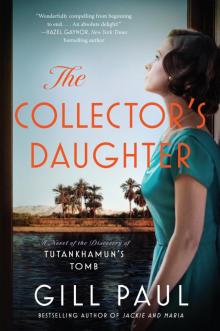 The Collector's Daughter
The Collector's Daughter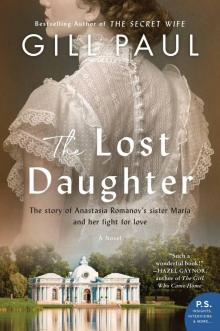 The Lost Daughter
The Lost Daughter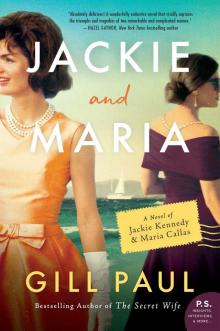 Jackie and Maria
Jackie and Maria The Affair
The Affair Love...Maybe
Love...Maybe The Secret Wife
The Secret Wife No Place For a Lady
No Place For a Lady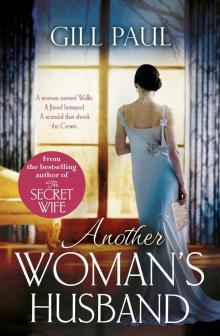 Another Woman’s Husband
Another Woman’s Husband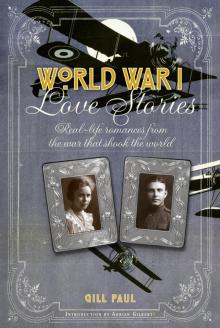 World War I Love Stories
World War I Love Stories World War II Love Stories
World War II Love Stories